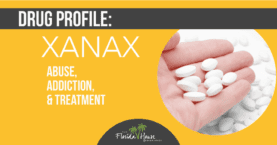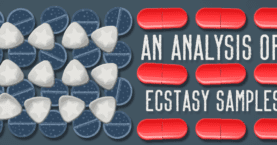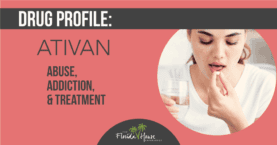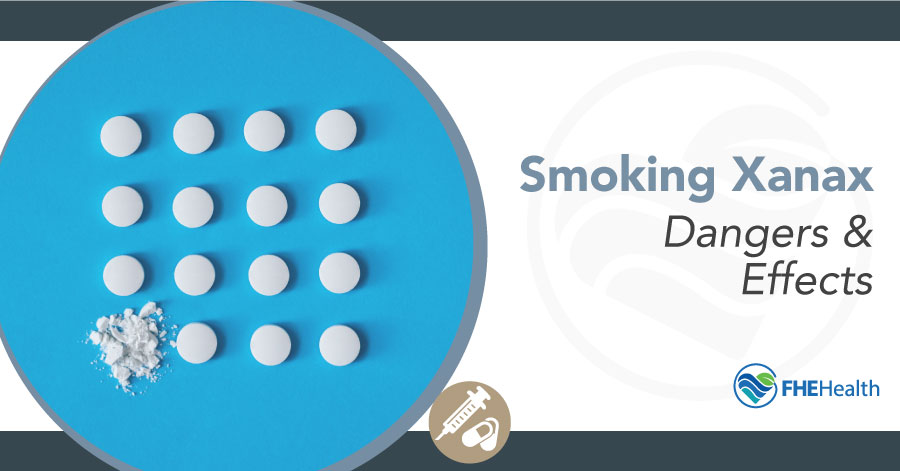
|
|
Xanax is a popular, anti-anxiety medication that belongs to a class of “benzodiazepine” or “benzo” drugs. These drugs are known for their calming effects. When taken as prescribed, Xanax and other drugs in the same class (Ativan, Klonopin, etc.) relieve the symptoms of clinically diagnosed conditions such as anxiety or panic disorders.
But Xanax is also a drug of abuse that some people smoke. When smoked, this short-acting benzo delivers a pleasurable “high” that can be habit-forming. But this practice has its dangers. Among them: the increased risks of overdose, negative health effects, and the problems of dependency and addiction….
Can You (Really) Smoke Xanax Pills?
The answer is “yes”— although it’s never advisable. In addition to inhaling or injecting Xanax, recreational users of the drug may sometimes smoke Xanax pills. They reportedly do this by first crushing up the pills into powder and then mixing the powder with marijuana, tobacco, or other benzos in a joint or an e-cigarette. Some non-medical users will even wrap the pill powder in foil to smoke it.
Is Smoking Xanax Dangerous?
Like other benzo drugs, Xanax is a safe medication when used as directed. Many people have found relief from diagnoses of insomnia, anxiety disorders, or other mental health conditions, by taking doctor-prescribed Xanax.
But Xanax is also a controlled substance with a propensity for abuse. That’s because of the relaxed high it gives users. Taking the drug without a prescription and in a non-medical mode of ingestion like smoking is therefore potentially very dangerous.
The Risks and Potential Effects of Smoking Xanax
Just what are the dangers? The main risks and potentially scary effects of smoking Xanax are as follows:
- Potential Overdose – Smoking Xanax can increase the chances of a deadly overdose. That’s because it’s much harder to determine how much you are consuming when you’re crushing up a few different pills and smoking them.
An overdose can also cause alarming complications like:
-
- Low blood pressure that in milder cases can lead to fainting and fall-related injuries and in more severe cases can damage the heart and/or brain
- Heart attacks from plummeting blood pressure or respiratory arrest
- Aspiration pneumonitis, an infection caused by germs from particles lodging in the lungs
- Rhabdomyolysis, in which toxins from dying skeletal muscle tissue enter the bloodstream, causing kidney failure
- Quicker Path to Xanax Addiction – Smoking Xanax ensures that the drug reaches the brain more quickly, with the result that the effects set in much more quickly and are more potent. Consequently, there’s also a greater likelihood of dependence and addiction. The use of more benzodiazepines at higher rates can lead to a pattern of needing more and more of the drug just to achieve the same high.
- The Added Risks of Street-Sold Xanax – Recreational use of Xanax often entails purchasing the drug on the street. But street-sold Xanax isn’t a known entity and can be cut with other far more dangerous drugs like fentanyl.
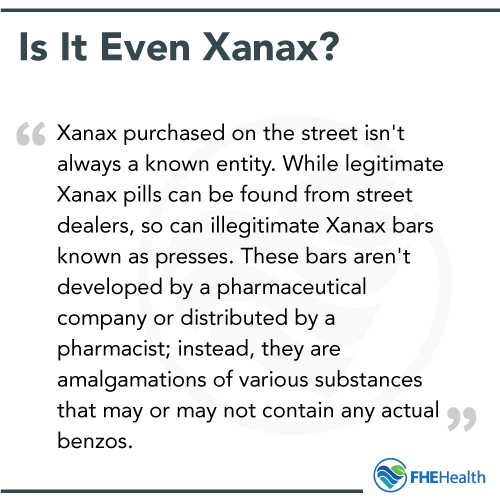 While legitimate Xanax pills can be found from street dealers, so can illegitimate Xanax bars known as presses. These bars aren’t developed by a pharmaceutical company or distributed by a pharmacist; they are amalgamations of various substances that may or may not contain actual benzos. Smoking a pressed Xanax bar that includes opiates can lead to serious injury or death. It’s a terrifying truth that many users may not realize until it’s too late.
While legitimate Xanax pills can be found from street dealers, so can illegitimate Xanax bars known as presses. These bars aren’t developed by a pharmaceutical company or distributed by a pharmacist; they are amalgamations of various substances that may or may not contain actual benzos. Smoking a pressed Xanax bar that includes opiates can lead to serious injury or death. It’s a terrifying truth that many users may not realize until it’s too late.
- The Mode of Administration (Heating and Smoking Xanax) – Heating Xanax can change how it works in potentially dangerous, unstudied ways. Meanwhile, smoking the drug introduces added health hazards, like mouth burns, respiratory issues, and certain cancers.
The Current State of Xanax Use
Xanax, the trade name for alprazolam, is a Schedule IV-controlled substance and is only legally available with a doctor’s prescription due to the high possibility for addiction and abuse. Xanax is a short-acting benzodiazepine. It kicks in quickly and lasts for several hours within the body, unlike long-acting benzos, which can be in effect for 12 to 24 hours.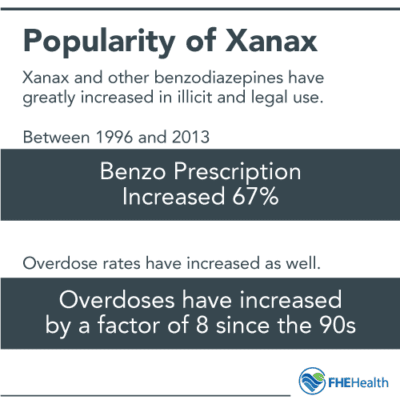
Benzodiazepines can be prescribed for many different medical conditions. The drugs are most widely taken for anxiety disorders like generalized anxiety disorder (GAD) and panic disorder. However, some doctors recommend medications like Xanax to relieve anxiety related to mood disorders like depression— and to temper nausea from chemotherapy in cancer treatment.
Benzodiazepines have surged in popularity in recent years. One reason may be the drugs’ glorification by pop culture. Rapper Lil Xan got his name from Xanax; and the popular, colloquial term “xanny bars” has made the drug sound more harmless than it is.
Between 1996 and 2013, the number of adults with benzo prescriptions grew 67% in the U.S. while the total dispensed quantity of pills tripled. The FDA considers it one of the top prescription drugs available on the illicit drug market.
Overdoses are on the rise as well. They have increased eightfold since the 1990s and caused the deaths of high-profile people like Rapper Lil Peep, who died from a benzo overdose in 2017.
The surge in benzo overdoses has become so worrisome that researchers in The New England Journal of Medicine have dubbed it “our other prescription drug problem” next to opiates. (Opiates constitute an even more dangerous and widespread public health crisis.)
Other Methods of Consuming Xanax
Xanax is used daily by millions of people across the United States, both responsibly (as prescribed by a doctor) and irresponsibly (non-medically and recreationally). In addition to smoking Xanax, here are some other methods by which people consume the drug:
- Oral: Oral ingestion is how Xanax is meant to be taken when prescribed by a professional and the most common method of use and. Xanax is highly effective when taken orally. Its therapeutic effects kick in only 20-30 minutes after ingestion. However, for someone with a Xanax problem who wants to get high as quickly as possible, this delayed onset can still seem too long.
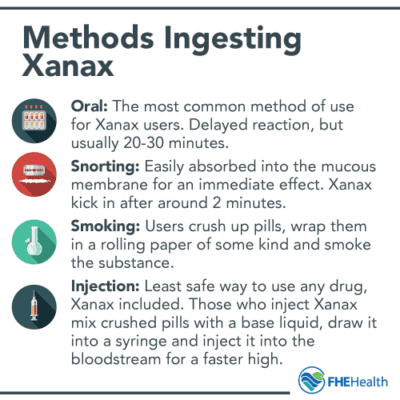
- Snorting: Snorting is a common way to use recreational drugs of all kinds. That’s because they can pass much more quickly through the nose’s mucous membrane for immediate effect. The effects of Xanax kick in around two minutes after a person snorts the drug— much faster than via conventional use.
- Injection: Injection is arguably the least safe way to use any drug, Xanax included. Those who inject Xanax mix crushed pills with a base liquid, draw it into a syringe and inject it into the bloodstream for a faster high. Injecting drugs opens the door to other issues related to injection, including diseases transmitted from needles, vein damage, abscesses and infections, scarring, needle tracks and endocarditis.
Getting Help for Xanax Abuse
Smoking, snorting, or injecting Xanax in an effort to get high is a warning sign of abuse, dependency, and/or addiction. Similarly, regularly taking more pills than a doctor has prescribed may signify an escalating problem. But there is effective, medical help available.
Seeking treatment at a quality addiction rehabilitation facility can help you overcome an addiction to Xanax in safe, healthy manner. At FHE Health, we are dedicated to helping those with substance use disorders achieve long-lasting freedom from addiction. Contact us today to learn more about how Xanax and benzodiazepine treatment can help you end your dependency and achieve better health and quality of life.
